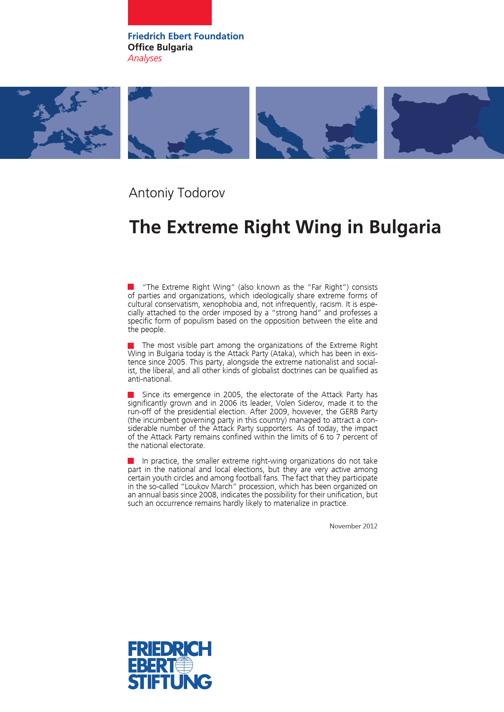Publikationen der StiftungThe extreme right wing in Bulgaria Titel
Titelaufnahme
- TitelThe extreme right wing in Bulgaria
- Verfasser
- Erschienen
- Umfang1 Online-Ressource (28 S. = 1 MB PDF-File)
- AnmerkungElectronic ed.: Sofia ; Bonn : FES, 2013
- SpracheEnglisch
- SerieAnalyses / Friedrich Ebert Foundation, Office Bulgaria
- DokumenttypDruckschrift
- Schlagwörter
- Geografika
- URN
- Das Dokument ist frei verfügbar
- Nachweis
- Archiv
�The Extreme Right Wing� (also known as the �Far Right�) consists of parties and organizations, which ideologically share extreme forms of cultural conservatism, xenophobia and, not infrequently, racism. It is especially attached to the order imposed by a �strong hand� and professes a specific form of populism based on the opposition between the elite and the people. The most visible part among the organizations of the Extreme Right Wing in Bulgaria today is the Attack Party (Ataka), which has been in existence since 2005. This party, alongside the extreme nationalist and socialist, the liberal, and all other kinds of globalist doctrines can be qualified as anti-national. Since its emergence in 2005, the electorate of the Attack Party has significantly grown and in 2006 its leader, Volen Siderov, made it to the run-off of the presidential election. After 2009, however, the GERB Party (the incumbent governing party in this country) managed to attract a considerable number of the Attack Party supporters. As of today, the impact of the Attack Party remains confined within the limits of 6 to 7% of the national electorate. In practice, the smaller extreme right-wing organizations do not take part in the national and local elections, but they are very active among certain youth circles and among football fans. The fact that they participate in the so-called �Loukov March� procession, which has been organized on an annual basis since 2008, indicates the possibility for their unification, but such an occurrence remains hardly likely to materialize in practice.
